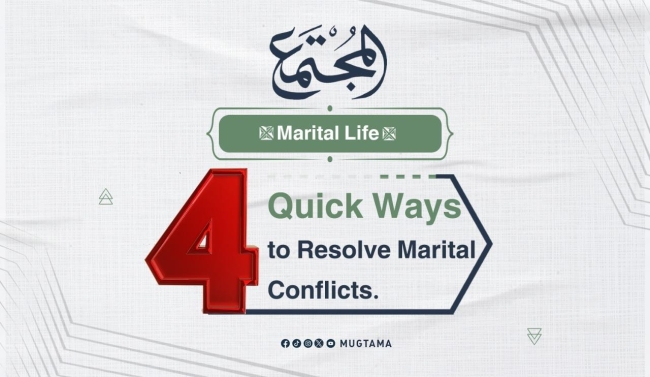No household is free from problems or crises, and no marital life is without its irritations or conflicts. However, each party has their own magical solutions to end the dispute, only if they have the will to do so. They can even turn the conflict into a space for affection, understanding, and dialogue.
Couples need a new space for innovation and unconventional tools to overcome estrangement and conflict. This is possible if their relationship is strong and their understanding is deep, which is determined by several factors such as educational level, spiritual state, and psychological and mental fitness, among others.
These lines offer both spouses effective and quick ways to resolve conflicts, in addition to traditional attempts at reconciliation, such as reproach, offering gifts, or seeking intervention from a trusted family member to end the problem between the spouses.
John Gottman, a psychologist at the University of Washington and researcher in marital issues, highlights the first method to resolve conflicts: smiling. He considers it a means of calming down and absorbing the anger of the other party. Through a genuine smile, a spouse can embrace their partner, transforming negative emotions into positive ones.
The genuine smile is the secret weapon of emotionally intelligent spouses who can contain their partners through verbal or physical gestures that may succeed in defusing tension and absorbing the other's anger, according to Gottman in his book “The Seven Principles for Making Marriage Work.”
The second method starts with a word, for example, “Can I hug you?” or “I want to fix what I did,” or “Sorry, I didn't mean that,” or “Let me fix what I did.” These words carry extremely important meanings and can end the conflict in an instant because the guilty party did not resist and quickly showed respect for the other, expressing readiness to fix what was spoiled. These words indicate good intentions from the husband or wife, hastening the resolution of the conflict.
Family and social experts say that a clear apology is capable of resolving the conflict, or at least preventing it from escalating or getting out of control. Therefore, those who possess the culture of apology are the most successful in managing their disputes. Why not, when they hold a magical key to avoiding conflicts, which is a noble character recommended by the Holy Quran. It says in the words of Queen Sheba, who grew up in a pagan environment: “My Lord, indeed I have wronged myself, and I submit with Solomon to Allah, Lord of the worlds.” (An-Naml: 44) When Musa accidentally killed a man, he admitted his wrongdoing, saying: “This is from the work of Satan. Indeed, he is a manifest, misleading enemy. He said, 'My Lord, indeed I have wronged myself, so forgive me,' and He forgave him. Indeed, He is the Forgiving, the Merciful.” (Al-Qasas: 15-16)
The third method involves a kind gesture towards the other party, such as feeding them in their mouth, as our Prophet, peace and blessings be upon him, instructed. The best charity for a man is a morsel he places in his wife's mouth or money he spends on his children. Sa'd ibn Abi Waqqas narrated that the Messenger of Allah, peace and blessings be upon him, said: “You will get a reward for whatever you spend for Allah's sake, even for what you put in your wife's mouth.” (Agreed upon) The Prophet also said: “Verily, when a man quenches the thirst of his wife with water, he will be rewarded.” (Narrated by Ibn Majah)
Undoubtedly, such a gesture will dispel feelings of anger in the wife and restore her sense of tenderness and affection from her husband. It can eliminate the conflict entirely and open a wide door for reconciliation, love, and mutual appreciation, especially if they reciprocate the same gesture. This fosters love between them, and the Prophet, peace and blessings be upon him, was the best in dealing with and treating his family. He said, “The best of you is he who is best to his family, and I am the best among you to my family.” (Narrated by Ibn Majah)
The fourth method is also derived from the noble Sunnah. The Prophet, peace and blessings be upon him, used to race with his wife, Aisha, may Allah be pleased with her, to bring joy to her heart. He would call her ‘Aeish to show affection, entertain her with conversation, tell her stories, and listen to her when she spoke. He was keen to drink from the spot where she drank.
These gestures indicate good companionship, defuse tension, and quickly resolve conflict. They are short paths to love, mercy, and harmony, making it easy to respond to them. With the couple's experience, each can find the special gesture or affectionate word that suits the other, signaling the end of estrangement and conflict.
So, we have before us a smile, a word, affection, and endearment. These are simple yet very effective actions. The reason, as Gottman explains, is that emotional interactions between spouses are like a balance in their emotional bank account. Any investment in this account increases their savings, which will support them during difficult times.
In other words, these simple methods are based on the emotional bank account that the husband or wife established at the beginning of their life together. Each party increases the balance of love and affection in the other's account. If the husband deposits positive emotional investments, his attempts will succeed. Similarly, if the wife increases her emotional balance with her husband, he will surely forgive her mistakes and overlook them.
-------------------------------------------------------------


